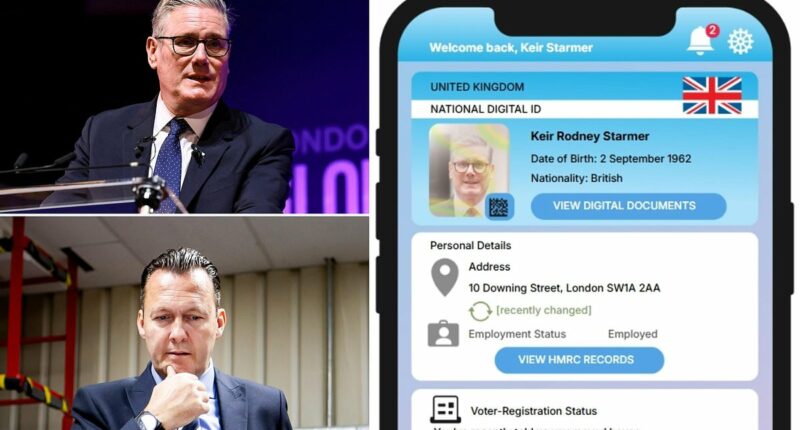Share this @internewscast.com
Sir Keir Starmer’s ‘authoritarian’ plans for digital ID cards yesterday prompted an angry backlash from across the political spectrum.
The Prime Minister argued that enforcing a work requirement is key to addressing illegal immigration, strengthening the UK’s borders, and bringing numerous advantages to residents.
But opposition parties branded it a ‘dangerous step towards a surveillance state’.
Sir Keir said it would become easier to ‘prove your identity to access key services swiftly – rather than hunting around for an old utility bill’.
But the announcement, on the eve of a turbulent Labour conference for the beleaguered leader, was met with widespread hostility.
Opponents likened it to George Orwell’s novel Nineteen Eighty-Four, and said it would not stop the boats or deter illegal employment.
Russell Findlay, leader of the Scottish Conservatives, expressed concerns about having a digital ID on his phone, forecasting that the initiative could lead to financial waste and failure.
In today’s Mail, he expressed that such a plan could be easily misused or intentionally exploited, leading to taxpayers being burdened with costs while being monitored by Keir’s government.

How Labour’s digital ID card could look on your mobile phone

Scottish Tory leader Russell Findlay led the backlash against Sir Keir’s plans

Under the Prime Minister’s plan, digital ID would become the authoritative proof of identity and residency status in the UK
He further stated, ‘I wouldn’t trust Sir Keir Starmer with something as simple as running a bath, let alone managing a complicated and expensive digital ID program. This is even before considering the implications for individual liberty and privacy. It represents an excessive attempt at government control and is a glaring overreach by Starmer.’
Labeling the initiative as ‘absurd’, he remarked that ‘Honest employers already verify their employees’ identification prior to hiring, and the government already gathers sufficient information on citizens for things like passports and other identification.’
Reform UK called the plans a ‘cynical ploy’ designed to ‘fool’ voters into thinking something is being done about immigration.
Tory leader Kemi Badenoch also dismissed them as a ‘gimmick that will do nothing to stop the boats’.
The Liberal Democrats declared they would firmly oppose these plans, while a petition against it on the parliamentary website has amassed over 1.2 million signatures.
Under Labour’s plan, digital ID would become the authoritative proof of identity and residency status in the UK.
It would include a person’s name, date of birth, and a photo, and be compulsory for work. Although immigration and employment law are reserved to Westminster, if a digital ID was needed to access a devolved service, such as housing, Holyrood would become involved.
MSPs would not be able to block UK legislation, but they could withhold their consent, triggering a constitutional row which would play into the hands of the SNP.
Scottish Green MSP Maggie Chapman said it should not be ‘forced on Scotland without a vote at Holyrood’. The North East MSP said: ‘The compulsory nature of these cards is an affront to democracy and choice.’
First Minister John Swinney said the PM seemed to be trying to ‘force every Scot to declare ourselves British’, adding: ‘People should be able to go about their daily lives without such infringements.’
Reform MSP Graham Simpson said the plan was ‘nothing short of authoritarian’ and a ‘step towards a surveillance state’.
He said: ‘This is a just a cynical attempt by a weak Prime Minister to appear tough on immigration while ignoring the real issues – border enforcement, visa abuse and criminal trafficking networks. Starmer’s digital ID plan is a gimmick, not a solution.’
Scottish Liberal Democrat MP Susan Murray said that the plan would be ‘worrying’ for many older people, those living in poverty and the disabled – who are more likely to be digitally excluded.
Scottish Secretary Douglas Alexander told BBC Radio Scotland: ‘You won’t be required to carry it or produce it, except to prove your right to work.’
The Lothian East MP added: ‘It will be required by the end of the Parliament to try to clamp down on illegal working.’

















